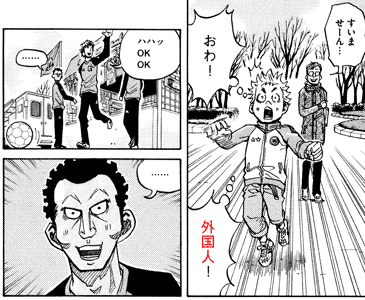In Japanese, gaijin 外人 means "foreigner." Literally "outsider." It's synonymous with gaikokujin 外国人, except that gaijin is considered to be offensive while gaikokujin is not.
Pronunciation
For the record, how gaijin is pronounced:
- Guy Djinn.
- Guy Engine (without the "en")
- Guy Gym (not exactly, but close enough)
How gaijin is NOT pronounced:
- Gay Jim
- Giant Gem
- Gee Dim
See romaji for why it's spelled gaijin.
Meaning
Both gaijin and gaikokujin refer to someone who isn't Japanese. They're generally interchangeable, except that the former is considered offensive by some and may be avoided in TV programs, etc.
- Context: a kid sees a foreigner.
- suimaseen...
すいませーん
(a contraction of...)- sumimasen
すみません
Excuse me.
Sorry.
- sumimasen
- owa!
おわ!
Whoa! - gaikokujin!
外国人!
A foreigner! - haha' ok ok
ハハッOK OK
Hahah. Ok. Ok.
kanji
The kanji of gaijin and gaikokujin mean:
- soto
外
Outside. - kuni
国
Country. - hito
人
Person.
The word gaikokujin means literally "outside-country-person," while gaijin just "outside-person," so one literally means "a person from another country," while the other literally means an "outsider."
Historically, gaijin could mean just "outsider," yoso-mono よそ者, but that was centuries ago, and it was pronounced guwaijin グワイジン at the time instead. Normally, gaijin means "foreigner."[外国人 - dic.nicovideo.jp, accessed 2020-06-25]
- soto no hito
外の人
Someone from outside.
Note that if you spell the word with kanji backwards, you get a different word:
- jingai
人外
Outside person. Non-human. (e.g. monster girls.)
Offensiveness
The reason why gaijin is considered offensive is because it has racist connotations. The word gaijin isn't simply a way to differentiate:
- nihonjin
日本人
Japanese person.
From:
- hi-nihonjin
非日本人
Non-Japanese person.
Instead, it typically refers from someone who isn't Asian.[外人 - kotobank.jp, accessed 2020-06-25]
Someone who is neither Japanese, nor:
- chuugokujin
中国人
Chinese person. - kankokujin
韓国人
South Korean person. - chousenjin
朝鮮人
North Korean person. - taiwanjin
台湾人
Taiwanese person.
In other words, someone from west, a "western."
Given this, it's more politically correct to say gaikokujin instead.
Note, however, that some foreigners in Japan don't care which word is used, and neither do Japanese natives. For many people, gaijin is an abbreviation of gaikokujin and nothing more.
Then again, "jap" is an offensive abbreviation of "Japanese" in America.
Sometimes, gaijin is chosen due to its offensiveness.
- baka gaijin
馬鹿外人
"Stupid foreigner."- Self-deprecating phrase used sarcastically by weebs and foreigners learning Japanese.
Nevertheless, the point is that some people consider gaijin offensive and gaikokujin not.
"You got your salaryman in there, the delinquent school girl and her sugar daddy, Chinese people, and even those Nigerian touts. What's with all the fucking gaijin (foreigners) in the area anyway? It used to be just Japanese, Koreans and Chinese."
"M: Don't say gaijin. Say Gaikokujin. It's more polite. Jake's a gaijin."
"S: Yeah, I forget sometimes. What's with all the fucking gaikokujin in Kabukicho anyway?"
— The actual Yakuza, reviewing a game about the Yakuza, accessed 2020-06-25.
By the way, haafu ハーフ, "half," is a Japanese term to refer to someone who's half-Japanese, that is, who only has one Japanese parent.

As a Japanese American guy who was born in Hawaii but moved to Japan in 10th grade who is now married and living in Japan etc. I have a few things to point out the term Gaijin is not only used by Japanese in Japan but pretty much anywhere Japanese people are like Brazil, Peru, Okinawa (most don't know that Okinawa and or Okinawans are NOT Japanese) including the US.
ReplyDeleteIn Hawaii and California we used the term Gaijin for Caucasians mainly all the time along with other more colorful terms. In Japan the vast majority still use the term Gaijin outside of TV or media anyway. But imo Gaijin is NOT as offensive as the actual anti Asian crap in the states like J*P or Chink etc etc etc. If you speak Japanese you would know we have words far more offensive than Gaijin.. ;)